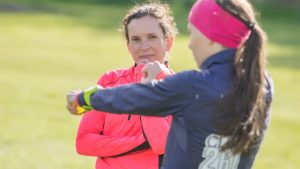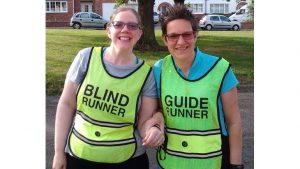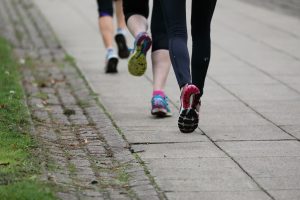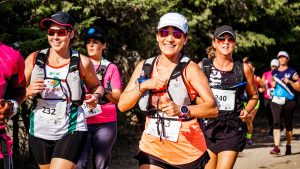You want to run but you’re too tired. Know that feeling? Of course, lots of people experience fatigue but it’s particularly common around the menopause. It can be so hard to motivate yourself to get out for a run when you just don’t feel like you have the energy. And won’t running make you even more tired?
Let’s explore menopausal fatigue, think about how to manage it and figure out how we can minimise its effects on our running. What can you do if your running is slipping because you’re so tired all the time? Don’t forget, you should always consider whether it’s definitely the menopause causing your tiredness or whether it could be something else.
What is fatigue?
I looked for definitions of fatigue and found lots of different takes including:
- A condition marked by extreme tiredness and inability to function due to lack of energy
- A lack of energy, feeling weak or being too tired to participate in family, work or leisure activities
- A feeling of tiredness or exhaustion that is not fully relieved by rest.
However you define it, fatigue is not fun. It can have a huge knock on effect to all areas of your life and suck the joy out of the every day.
What causes menopausal fatigue?
We often associate fatigue with poor sleep. I think it’s really important to know that you can have menopausal fatigue even if you’re sleeping well.
If your nights are disturbed by hot sweats and needing to keep getting up for a wee, then of course you’re not going to have a lot of energy the next day. But if you’re someone who isn’t struggling at night then it can be hard to understand why you feel so tired all the time. We know that the changing hormone levels that happen in the perimenopause have effects throughout the body. Fluctuating and falling oestrogen, progesterone and testosterone can directly affect your energy levels and your mood leaving you feeling low, lethargic and reaching for the caffeine.
Menopausal fatigue and running
Here are some of the effects that fatigue might have on your running:
- You lack motivation to run
- You run less often, less far and less intensely
- Your fitness falls
- You stop enjoying your running
- You beat yourself up
- You feel despondent when you see others running well
- You struggle to make running plans or book events
Basically it can be really rubbish! It can be quite a dramatic change for some runners who have always been full of energy, running frequently and training hard.
Tips for coping with menopausal fatigue
I’m not going to pretend there’s a magic or simple answer to this. Yes, HRT can help lots of women, but not everyone – more of this in a moment.
Here are 8 things that it might help to bear in mind:
1. Don’t blame yourself – Remember this isn’t your fault so don’t beat yourself up. It’s not going to last forever, although it might feel like it. You haven’t done anything wrong.
2. Save energy where you can – Look at what you can control. Are there things you can do that will save you energy such as getting a shopping delivery or delegating household chores? Look for ways to reduce stress levels; stress uses so much energy. Choose where you put the little energy you have and do whatever you can to maximise your sleep.
3. Fuel your runs properly – Running when tired is hard enough, but running when under fuelled will just make things worse. Skimping on breakfast or lunch will make running after work difficult. Snack before you run and avoid running fasted or hungry.
4. Avoid the roller coasters – It’s so easy to find yourself relying on caffeine, sugary snacks or even alcohol to get through the day but they actually make things worse. A quick boost is usually followed by a big dip in energy levels and you find yourself reaching for another. Keep well hydrated with non-caffeinated and low sugar drinks (water is great!) and choose foods that will give you sustained energy rather than quick spikes.
5. Try the run – You might not feel like running but give it a go. Have an open mind and tell yourself that you’ll do ten minutes of very easy running and then come home if you don’t want to go any further. You might find you feel OK once you’ve got going. If you don’t and that’s all you do, that’s fine too, it’s ten minutes of exercise and it all counts. Exercise can help you feel more energised. You might want to drop the intensity or do something other than running, give yourself permission.
6. Plan your running… or not – It can help to look at the week ahead and identify if you think there might be a better time to run, perhaps when you have less on. Having said that, sometimes menopausal fatigue is unpredictable so if you feel good then make the most of that opportunity and get out there. If you’re training for an event, prioritise your runs. If it’s a half or full marathon, then your long slow run is going to be the most important. Make this the focus of your week and reduce the other runs. Similarly, if you’re trying to PB at 5k, give your speed run the top spot in the week. You might have to miss other runs and take extra rest days but your most important run for your goal will be covered.
7. Phone a friend – When the fatigue is affecting your motivation, ask a running friend to help. If it’s a menopausal friend, then all the better. Explain the problems you’re having and see if they’ll make a date for a pressure-free chatty run.
8. Consider HRT – Not everyone can or wants to use HRT but it can be very helpful and even life-changing for many women. It’s particularly good for those vasomotor symptoms such as night sweats and hot flushes so if they’re draining your energy then you might notice a big improvement. HRT may help increase energy levels in women more generally but it’s always important to look at the multiple factors that might be draining your energy too.
What else causes fatigue?
With my former role as a GP it wouldn’t be right for me to let you go without saying, watch out, remember there are other things that can cause fatigue and unless you’re 100 per cent sure it’s purely your menopause and life, then you might be wise to at least discuss it with your doctor. Some of these conditions become more common around the menopause too:
- Thyroid disorders. Both an under and overactive thyroid can cause extreme fatigue.
- Depression. Tiredness often happens alongside a low mood with depression.
- Anaemia. Low red blood cell levels can leave you exhausted, this is more likely if you’re having heavy or frequent periods in association with your perimenopause.
- RED-S. Relative energy deficiency in sport is common. Accidentally (or intentionally) not consuming enough energy to meet the demands of your active lifestyle can cause daily fatigue as well as a whole host of other symptoms.
- Chronic fatigue syndrome. This is relentless, recurring and extreme fatigue that is not relieved by rest. The diagnosis is usually made after all other causes of fatigue have been ruled out
- Long COVID. Sadly we now need to add this to the list of causes of fatigue. Of course this condition isn’t fully understood yet but most people make a full recovery from COVID within 12 weeks. The NHS advises that you should see your doctor if your symptoms have persisted more than four weeks.
- Other medical conditions and medications. There are a host of conditions that have fatigue as a possible symptom including diabetes, heart disease and cancer. It’s rare for tiredness to be the only thing you feel though, usually there are other symptoms you notice too. If in doubt, make an appointment with your doctor.
I hope this is helpful. I know it’s hard but I think there’s every reason to remain positive. Just do what you can from the steps above and don’t fall out of love with running. If it’s simply too much then take a break, it will always be there for you when you’re ready again.
If you’d like to hear more about running and the menopause then sign up for my weekly newsletter below. Tell me about your menopausal fatigue and how you cope in the comments or on my socials.
Featured Image by Camargo Anthony via Pexels







